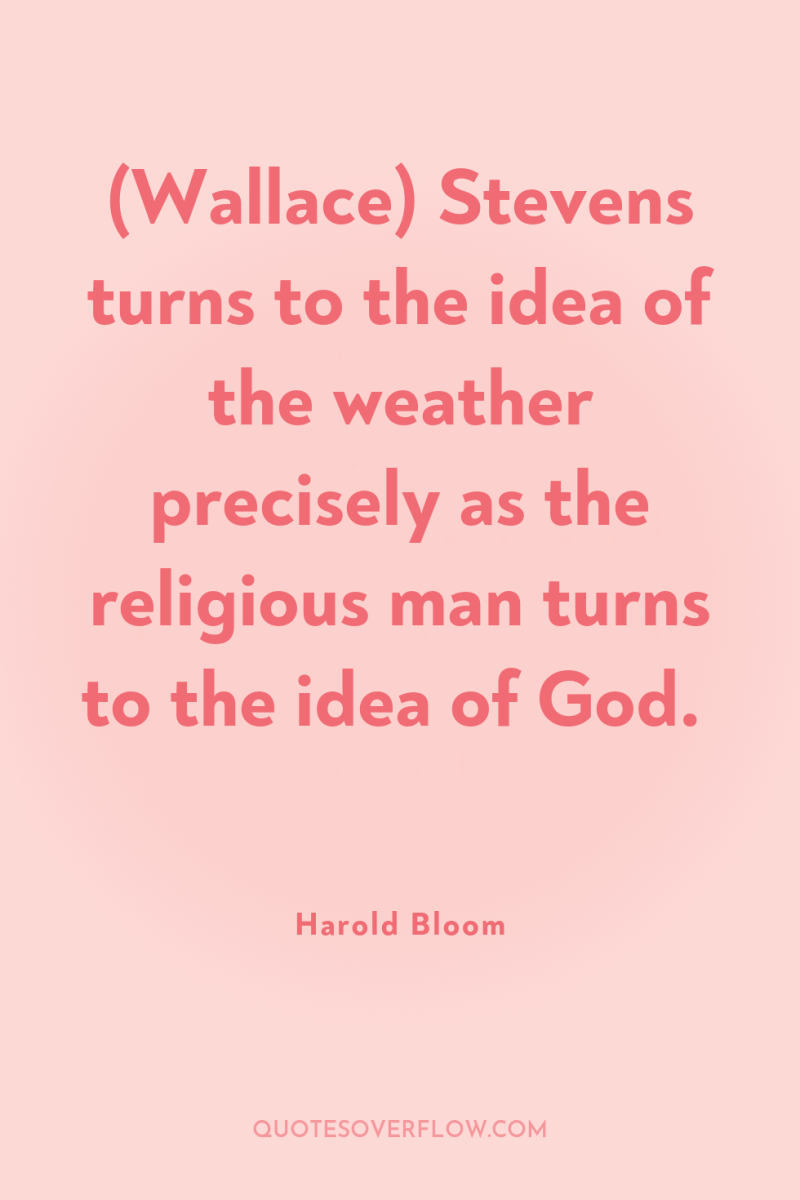
1
(Wallace) Stevens turns to the idea of the weather precisely as the religious man turns to the idea of God.Harold Bloom
2
Everyone wants a prodigy to fail it makes our mediocrity more bearable.Harold Bloom
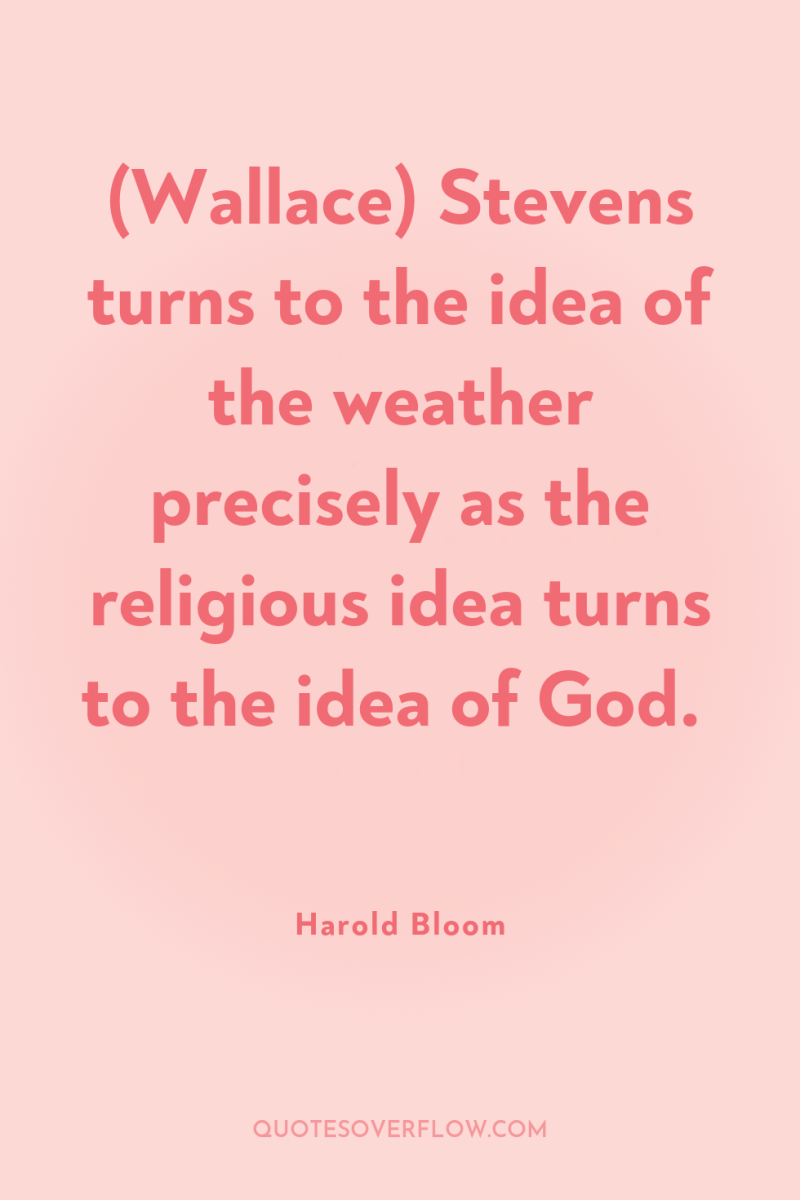
3
(Wallace) Stevens turns to the idea of the weather precisely as the religious idea turns to the idea of God.Harold Bloom
4
There's very little authentic study of the humanities remaining. My research assistant came to me two years ago saying she'd been in a seminar in which the teacher spent two hours saying that Walt Whitman was a racist. This isn't even good nonsense. It's insufferable.Harold Bloom
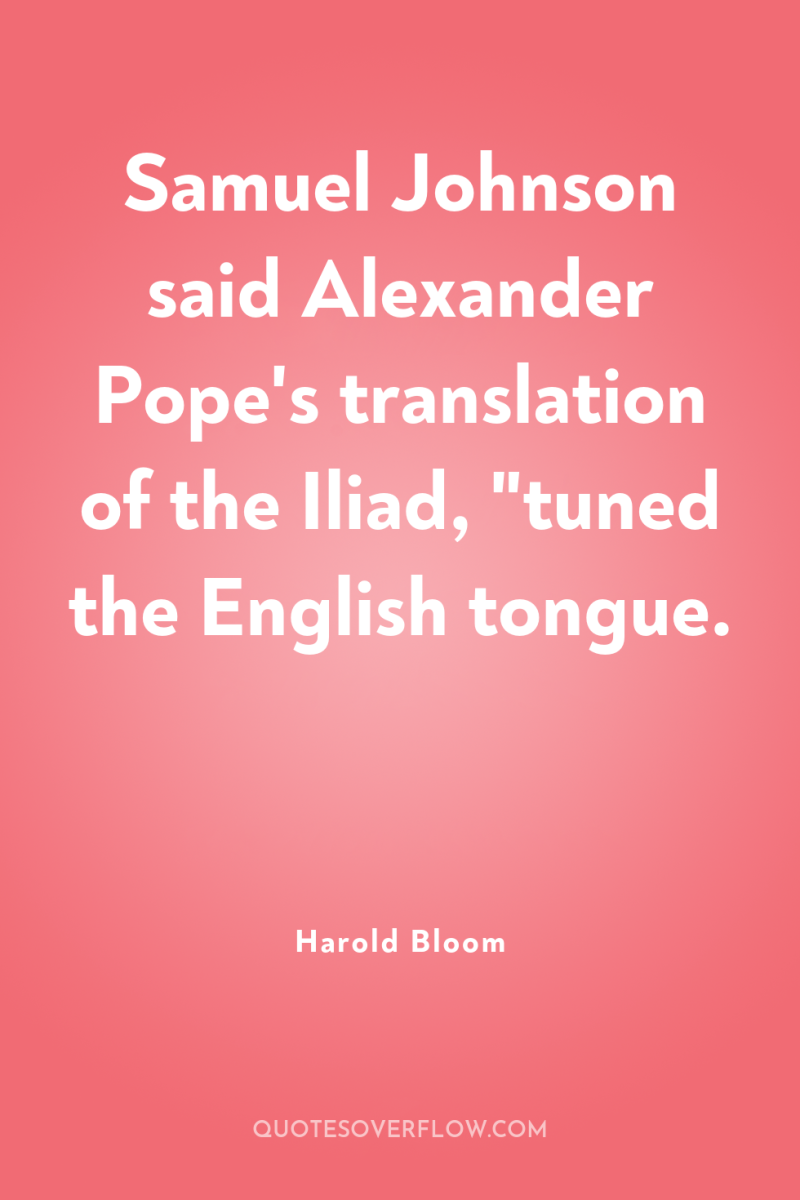
5
Samuel Johnson said Alexander Pope's translation of the Iliad, "tuned the English tongue.Harold Bloom
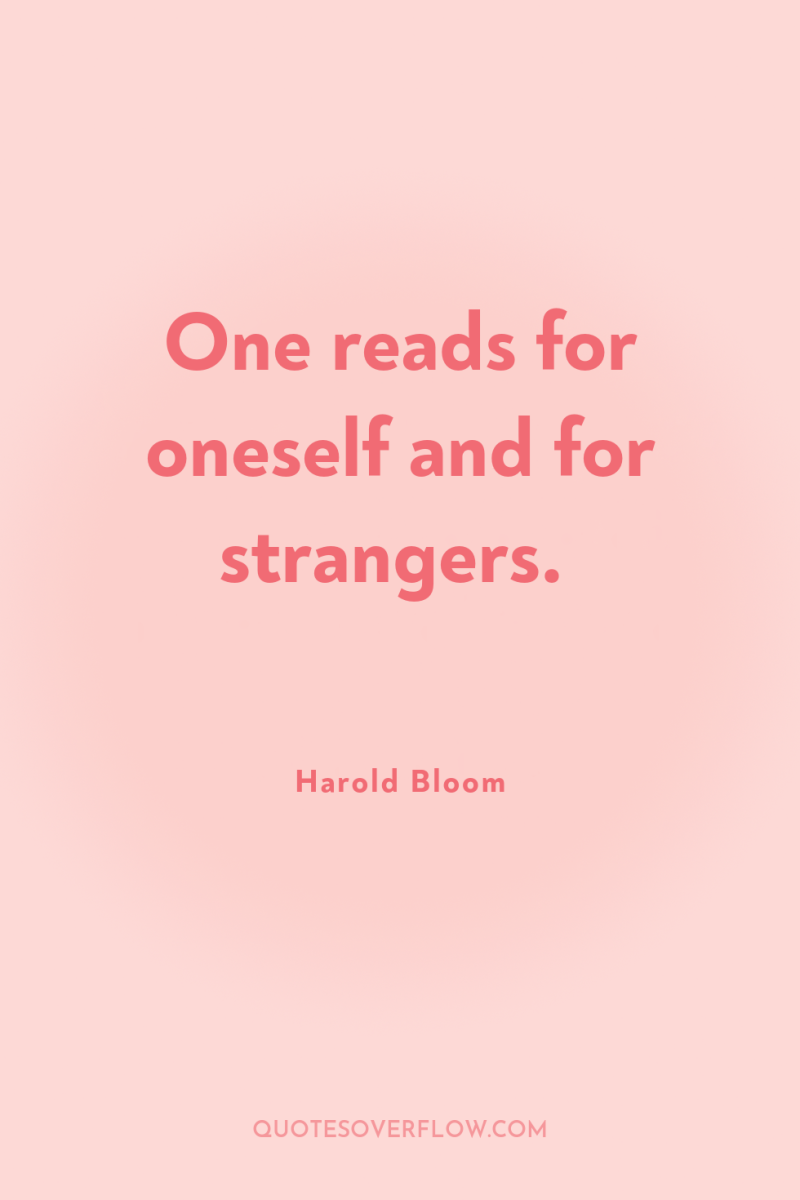
6
One reads for oneself and for strangers.Harold Bloom
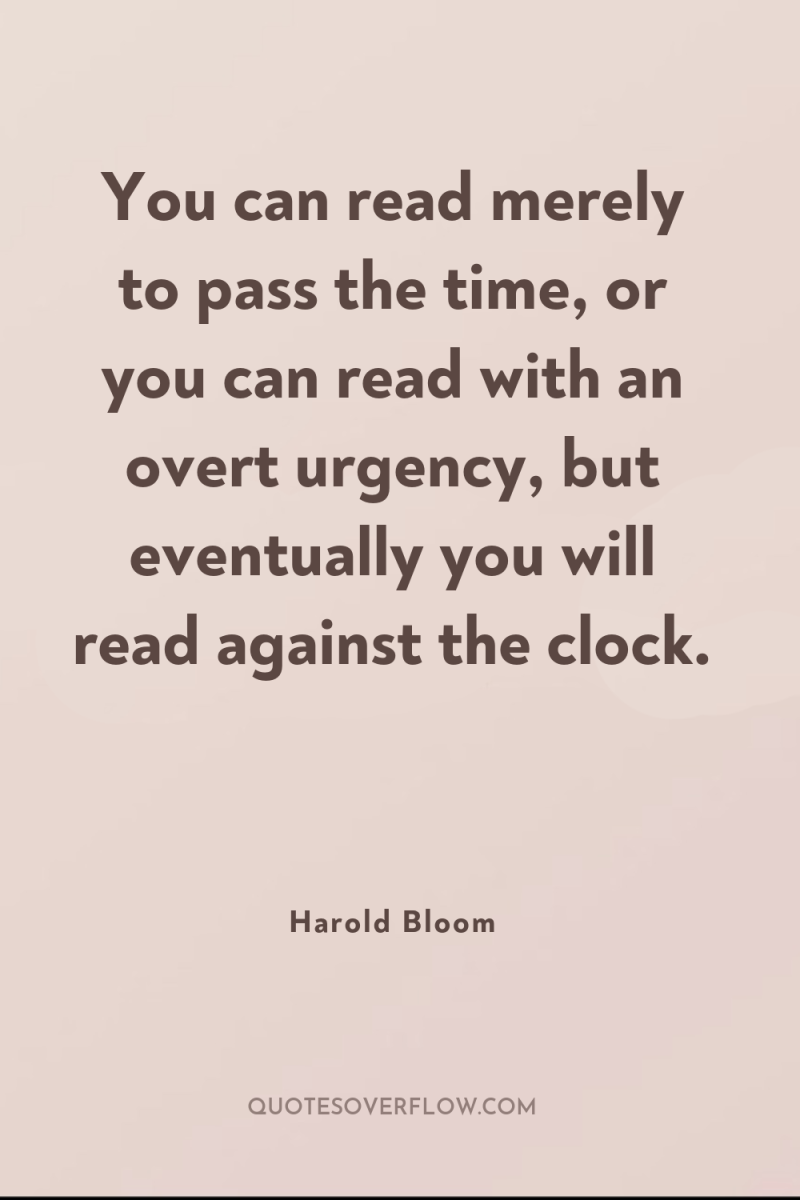
7
You can read merely to pass the time, or you can read with an overt urgency, but eventually you will read against the clock.Harold Bloom
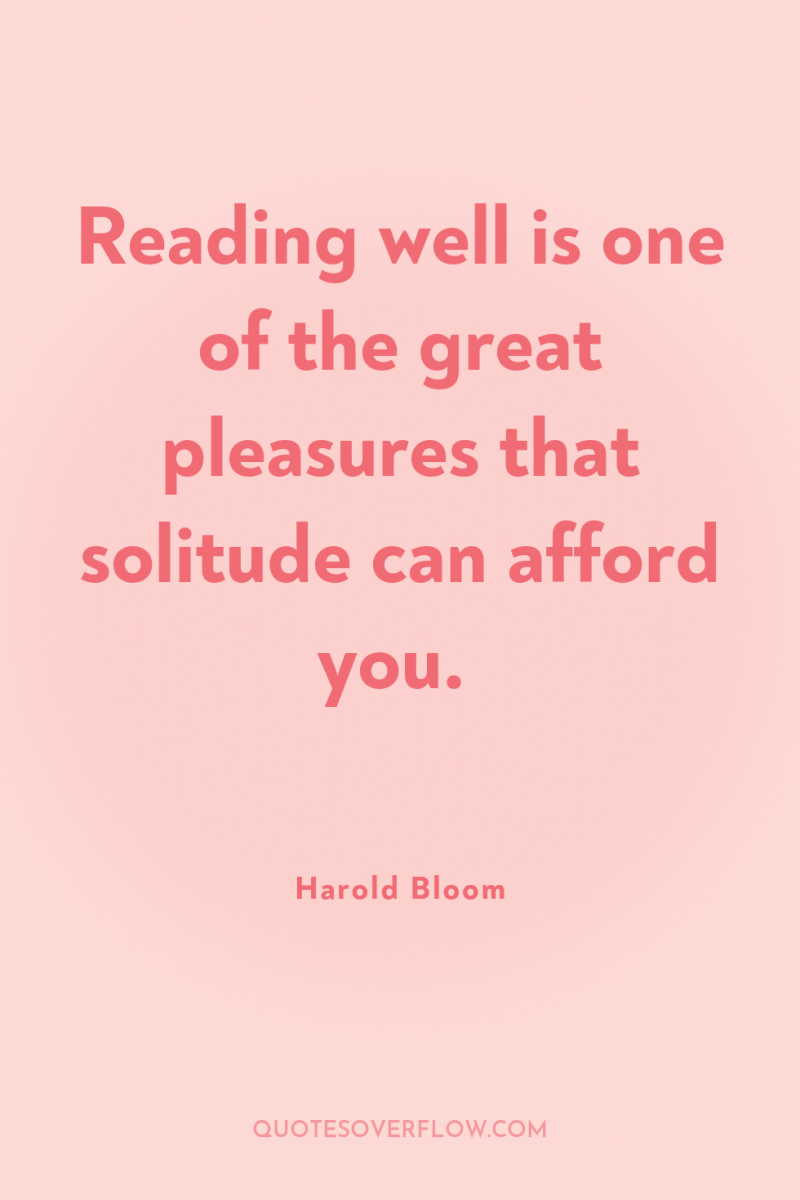
8
Reading well is one of the great pleasures that solitude can afford you.Harold Bloom
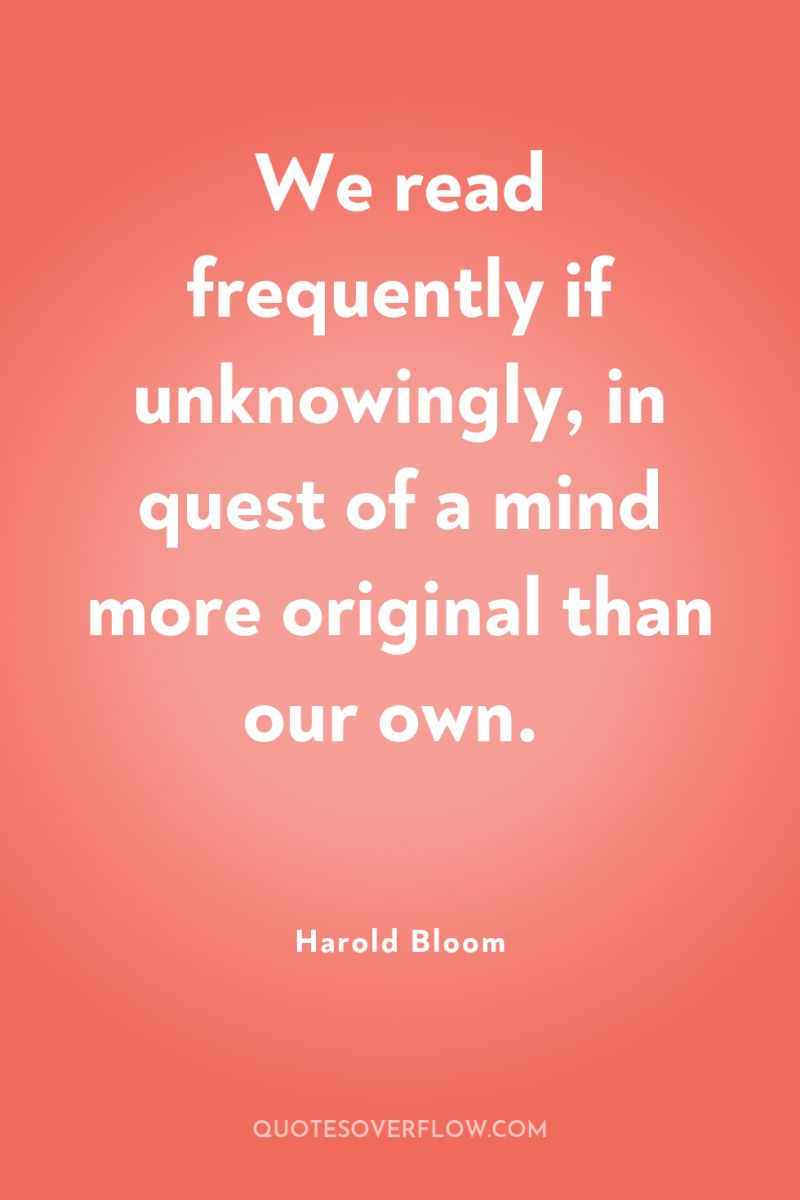
9
We read frequently if unknowingly, in quest of a mind more original than our own.Harold Bloom
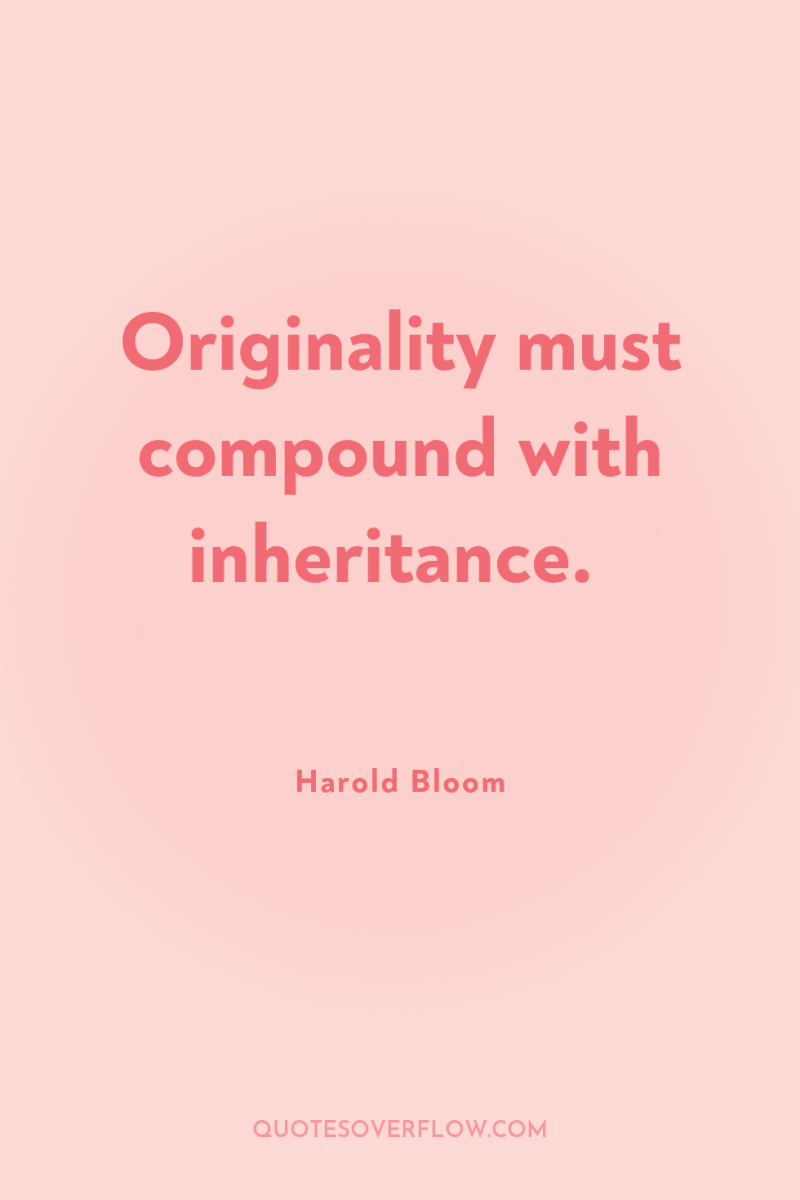
10
Originality must compound with inheritance.Harold Bloom
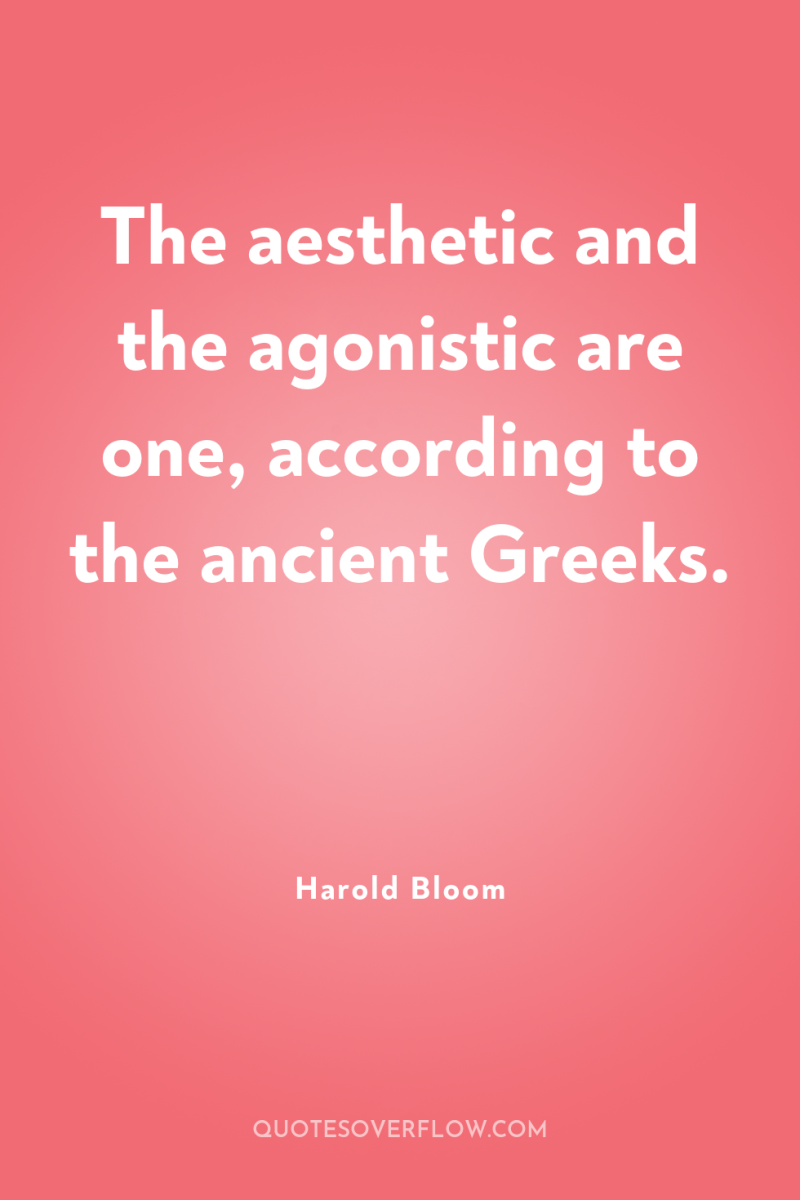
11
The aesthetic and the agonistic are one, according to the ancient Greeks.Harold Bloom
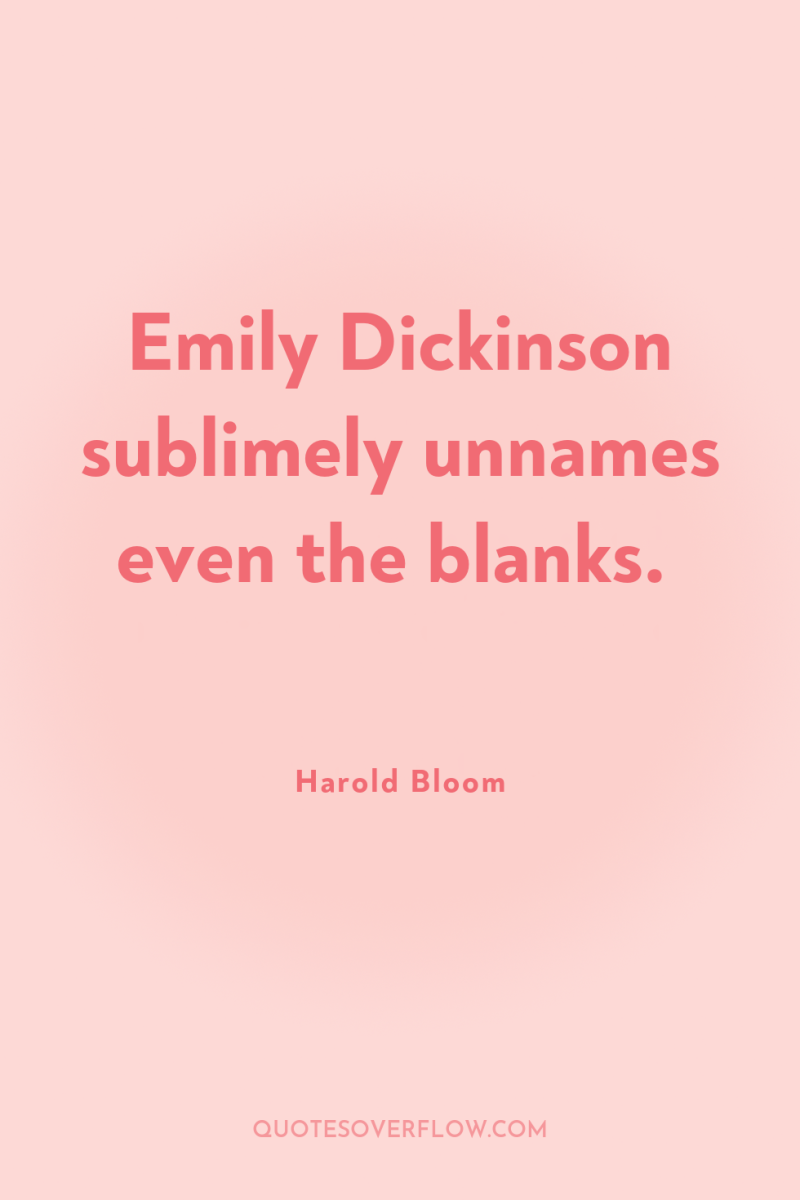
12
Emily Dickinson sublimely unnames even the blanks.Harold Bloom
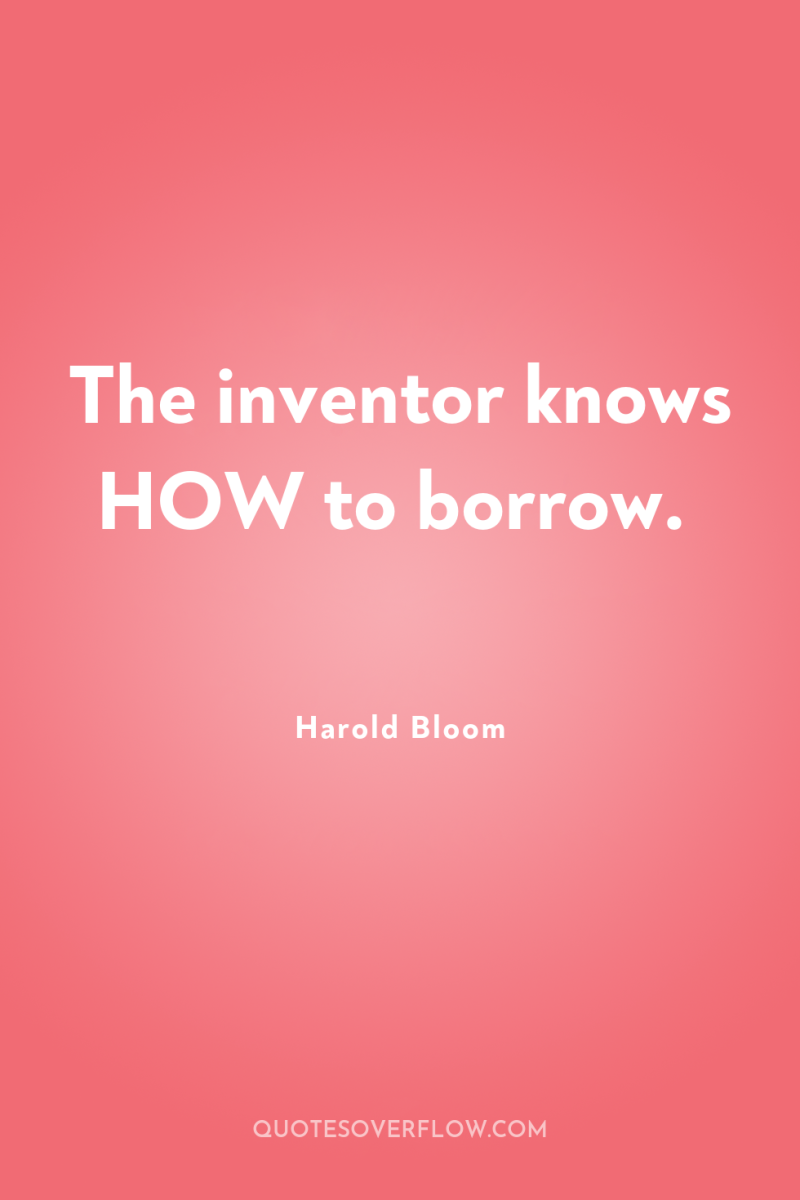
13
The inventor knows HOW to borrow.Harold Bloom
14
Persuasion is a strong but subdued outrider.Harold Bloom
15
King die hard, in Shakespeare and in life.Harold Bloom
16
How to read "Harry Potter and the Sorcerer's Stone"? Why, very quickly, to begin with, and perhaps also to make an end. Why read it? Presumably, if you cannot be persuaded to read anything better, Rowling will have to do.Harold Bloom
17
The creator of Sir John Falstaff, of Hamlet, and of Rosalind also makes me wish I could be more myself. But that, as I argue throughout this book, is why we should read, and why we should read only the best of what has been written.Harold Bloom
18
Shakespeare's exquisite imagining belies our total inability to live in the present moment.Harold Bloom
19
One mark of originality that can win canonical status for a literary work is strangeness that we either never altogether assimilate, or that becomes such a given that we are blinded to its idiosyncrasies.Harold Bloom
20
Reviewing bad books is bad for the character — WH AudenHarold Bloom
21
To read in the service of any ideology is not to read at all. The mind's dialogue with itself is not primarily a social reality. All that the Western canon can bring one is the proper use of one's own solitude.Harold Bloom
22
Great literature will insist upon its self-sufficiency in the face of the worthiest causesHarold Bloom
23
Great writing is always rewriting or revisionism, and is founded on a reading that clears space for the self.Harold Bloom
24
All writers are to some extent inventors, describing people as they would like to see them in life.Harold Bloom
25
Literary criticism, as I attempt to practice it, is in the first place 'literary', which is to say personal and passionate. It is not philosophy, politics, or institutionalised religion. At its strongest - Johnson, Hazlitt, Charles Augustin Sainte-Beuve, and Paul Valéer, among others - it is a kind of wisdom literature, and so a meditation upon life. Yet any distinction between literature and life is misleading. Literature for me is not merely the best part of life; it is itself the form of life, which has no other form.Harold Bloom
26
We are destroying all esthetic standards in the name of social justice.Harold Bloom
27
Greatness recognizes greatness, and is shadowed by it.Harold Bloom
28
Shakespeare and his few peers invented all of us.Harold Bloom
29
There is no God but God, and his name is William Shakespeare.Harold Bloom
30
Pragmatically, aesthetic value can be recognized or experienced, but it cannot be conveyed to those who are incapable of grasping its sensations and perceptions. To quarrel on its behalf is always a blunder.Harold Bloom
31
Aesthetic value emanates from the struggle between texts: in the reader, in language, in the classroom, in arguments within a society. Aesthetic value rises out of memory, and so (as Nietzsche saw) out of pain, the pain of surrendering easier pleasures in favour of much more difficult ones ... successful literary works are achieved anxieties, not releases from anxieties.Harold Bloom
32
Aesthetic criticism returns us to the autonomy of imaginative literature and the sovereignty of the solitary soul, the reader not as a person in society but as the deep self, our ultimate inwardness.Harold Bloom
33
Characters carrying the playwright's disapproval is a un- Shakespearian burden.Harold Bloom
34
Dante subsumed everything, and so, in a sense, secularized nothing.Harold Bloom
35
Reading well is one of the great pleasuresthat solitude can afford you, because it isat least in my experience, the most healing of pleasures.Harold Bloom
36
Memory is always in art, even when it works involuntarily.Harold Bloom
37
A poem, novel, or play acquires all of humanity's disorders, including the fear of mortalityHarold Bloom
38
Vision is defined as a program for restoring the human.Harold Bloom
39
Nietzsche tended to equate the memorable with the painful.Harold Bloom
40
I could not find any evidence that her circumstances had harmed Jane Austen's work in the slightest. That, perhaps, was the chief miracle about it. Here was a woman about the year 1800 writing without hate, without bitterness, without fear, without protest, without preaching. Her mind consumed all impediments.Harold Bloom
41
The aesthetic is an individual rather than a societal concern.Harold Bloom
42
When critics surrender to the prevailing orthodoxy, the author says they adopt the rhetoric of an occupied country, "one that expects no liberation from liberation.Harold Bloom
43
The work of great poetry is to aid us to become free artists ourselves... The art of reading poetry is an authentic training in the augmentation of consciousness, perhaps the most authentic of healthy modes.Harold Bloom
44
All canonical writing possesses the quality "of making you feel strangeness at home.Harold Bloom
45
Walter Pater defined Romanticism as adding strangeness to beauty.Harold Bloom
46
It has always been dangerous to institutionalize hope, and we no longer live in a society in which we will be allowed to institutionalize memory.Harold Bloom
47
Romance depends upon imperfect knowledge.Harold Bloom
48
Terror and rapture to Emily Dickinson are alternative words for "transport".Harold Bloom
49
Lawrence will go on burying his own undertakers.Harold Bloom
50
What Emily Dickinson does not rename or redefine, she revises beyond easy recognition.Harold Bloom
51
The old-fashioned sins of reading is the only sense that matters.Harold Bloom
52
Almost anything at all can be transmuted into a labyrinth.Harold Bloom
53
Capital is necessary to the cultivation of esthetic value.Harold Bloom
54
We read deeply for varied reasons, most of them familiar: that we cannot know enough people profoundly enough; that we need to know ourselves better; that we require knowledge, not just of self and others, but of the way things are.Harold Bloom
55
Since ideology, particularly in it's shallower versions, is peculiarly destructive of the capacity to apprehend and appreciate irony, I suggest that the recovery of the ironic might be our fifth principle for the restoration of reading.. But with this principle, I am close to despair, since you can no more teach someone to be ironic than you can instruct them to become solitary. And yet the loss of irony is the death of reading, and of what had been civilized in our natures.Harold Bloom
56
Tradition is not only bending down, or process of benign transmission. It is also a conflict between past genius and present aspiration in which the price is literary survival or canonical inclusion.Harold Bloom
57
Canonical writing is born of an originality fused with tradition. — From the book jacketHarold Bloom
58
At our present bad moment, we need above all to recover our sense of literary individuality and of poetic autonomy.Harold Bloom
59
To deprive the derelicts of hope is right, and to sustain them in their illusory "pipe dreams" is right also.Harold Bloom
60
I define influence simply as literary love, tempered by defense. The defenses vary from poet to poet. But the overwhelming presence of love is vital to understanding how great literature works.Harold Bloom
61
A play that takes as its burden the meaning of self-consciousness may hint that inner freedom can be attained only when the protagonist can separate his genius for expanding consciousness from his own passion for theatricality.Harold Bloom
62
[Lear] is the universal image of the unwisdom and destructiveness of paternal love at its most ineffectual, implacably persuaded of its own benignity, totally devoid of self-knowledge, and careening onward until it brings down the person it loves best, and its world as well.Harold Bloom
63
Consciousness is the materia poetica that Shakespeare sculpts as Michelangelo sculpts marble. We feel the consciousness of Hamlet or Iago, and our own consciousness strangely expands.Harold Bloom
64
No one yet has managed to be post- Shakespearean.Harold Bloom
65
No one has yet managed to be post- Shakespearean.Harold Bloom
66
Reading the very best writers–let us say Homer, Dante, Shakespeare, Tolstoy–is not going to make us better citizens. Art is perfectly useless, according to the sublime Oscar Wilde, who was right about everything. He also told us that all bad poetry is sincere. Had I the power to do so, I would command that these words be engraved above every gate at every university, so that each student might ponder the splendor of the insight. .Harold Bloom
67
The democratic age mourns the value of human beings.Harold Bloom
68
The second, and I think this is the much more overt and I think it is the main cause, I have been increasingly demonstrating or trying to demonstrate that every possible stance a critic, a scholar, a teacher can take towards a poem is itself inevitably and necessarily poetic.Harold Bloom
69
What we call a poem is mostly what is not there on the page. The strength of any poem is the poems that it has managed to exclude.Harold Bloom
70
Criticism in the universities, I'll have to admit, has entered a phase where I am totally out of sympathy with 95% of what goes on. It's Stalinism without Stalin.Harold Bloom